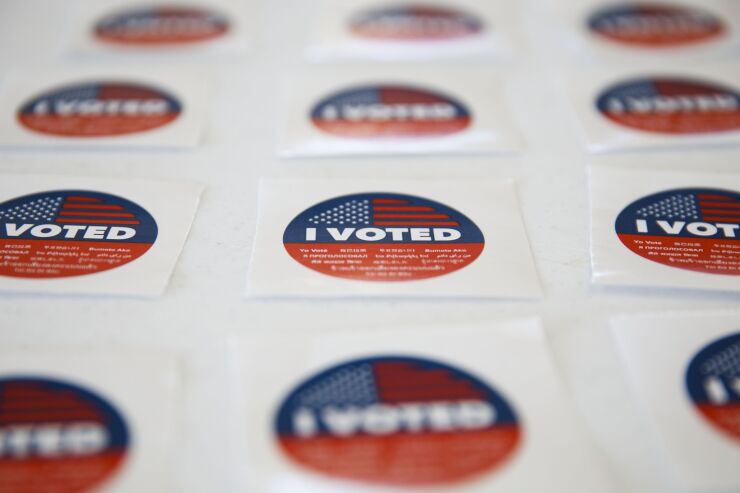When advisors pull the curtain closed on the voting booth on Election Day, many say they will be faced with a dilemma: Do they vote their conscience or their wallet?
This scenario was among the topics Financial Planning covered recently when 213 wealth management professionals were polled for its
While two-thirds of total respondents, 66%, said no, nearly one-third, 28%, said yes; 6% preferred not to say.
Reasons for the split
Stephan Shipe, founder and CEO of
"As a business owner, improving the business environment directly impacts my firm's ability to grow and create value which in turn affects my personal finances," he said.
READ MORE:
Shipe said his biggest concern is the potential for increased inflation due to higher government spending.
"Typically businesses can increase prices to counter the impact of minor increases in inflation," he said. "However, if inflation increases outside of normal bounds, I could see a world where my expenses would increase rather quickly, but I would not be able to increase fees as quickly as inflation moves. This would create a short-term gap in income versus expenses that, over the long run, should normalize as fee increases match inflation."
Kathy Gilchrist, founder and chief financial officer at
"But in general, the Republican Party is better at messaging to try to convince people that they are supportive of small businesses," she said. "Even though Democrats are more likely to increase SBA funding, the reality is that both major political parties cater to the desires of large corporations over smaller companies."
READ MORE:
If a small business owner cares about certain political policies, they might vote Republican instead of voting for their small business interest, she said.
"For example, a business owner might be concerned about the southern border issues over the last few years more than about their business interests," she said. "I spoke with a family member about politics, and this person cared about helping people, but they also cared about lower taxes for wealthy business owners. And they were voting Republican. Their vote for the Republican Party to improve their financial situation was at odds with their desire to help regular people."
Gilchrist said she's not in alignment with either major political party as she doesn't support war, "and both parties have been supporting war in recent years."
"I support universal single-payer health care that would help small businesses by removing the cost for businesses of paying for health insurance and would encourage entrepreneurship, but neither political party currently supports universal single-payer healthcare, even though the majority of voters do support the policy," she said.
Dichotomy seems to run mostly in one direction
A deeper look at the numbers and responses in the survey reveals that where these conflicts between personal beliefs and the bottom line exist, it's mostly on one end of the political spectrum.
"Trump would be better for business but the drama and nonsense is not good for my mental health," one anonymous advisor told the survey.
READ MORE:
Among those polled who said they were registered Republicans, 84% said they felt their personal and business interests were aligned on Election Day. However, for registered Democrats, it was almost an even split: 45% said they weren't and 48% said they were.
"Republicans are likely to be more tax and economically aligned for our industry," one advisor said in the survey. "Democrats are more socially aligned with my interests."
Survey responses, collected anonymously, revealed that the issues on which advisors feel their personal beliefs conflict with their business interests include taxes, regulations and debt, among others.
"I don't agree with a lot of what is proposed on the Republican Party plan overall, but for business and the stock markets the perceived plan and outcome looks more favorable," said one advisor. "I don't want Republicans in office."
Poll responses indicate that this split largely runs in only one direction — registered Democrats who feel a Trump presidency may be better for business, which conflicts with their strong personal distaste for the candidate.
"In the few areas such as regulations that I would favor the Republicans from a business interests perspective, these would be at odds with how strongly I dislike Donald Trump and most of his ideals," said one respondent.
A Democratic administration potentially means continued or greater compliance requirements and overregulation by the SEC and DOL, wrote another.
"But there also remains the option that a Republican may put someone completely unqualified in charge of the industry and make things far worse," they added.






